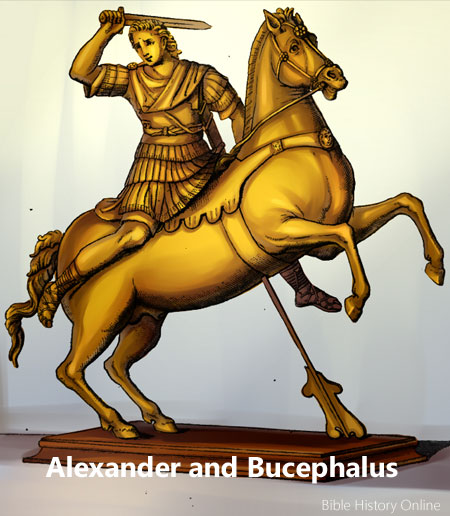31. arms--namely, of the human body; not weapons; human forces.
they--Antiochus' hosts confederate with the apostate Israelites; these
latter attain the climax of guilt, when they not only, as before,
"forsake the covenant"
(Da 11:30),
but "do wickedly against" it
(Da 11:32),
turning complete heathens. Here Antiochus' actings are described in
language which reach beyond him the type to Antichrist the antitype
[JEROME] (just as in
Ps 72:1-20
many things are said of Solomon the type, which are only applicable to
Christ the Antitype); including perhaps Rome, Mohammed, and the final
personal Antichrist. SIR ISAAC NEWTON refers the rest of the
chapter from this verse to the Romans, translating, "after him
arms (that is, the Romans) shall stand up"; at the very time that
Antiochus left Egypt, the Romans conquered Macedon, thus finishing the
reign of Daniel's third beast; so here the prophet naturally proceeds
to the fourth beast. JEROME'S view is simpler;
for the narrative seems to continue the history of Antiochus, though
with features only in type applicable to him, fully to Antichrist.
sanctuary of strength--not only naturally a place of strength, whence
it held out to the last against the besiegers, but chiefly the
spiritual stronghold of the covenant-people
(Ps 48:1-3, 12-14).
Apollonius "polluted" it with altars to idols and sacrifices of swine's
flesh, after having "taken away the daily sacrifice" (see on
Da 8:11).
place . . . abomination that maketh desolate--that is,
that pollutes the temple
(Da 8:12, 13).
Or rather, "the abomination of the desolater," Antiochus
Epiphanes (1 Maccabees 1:29, 37-49). Compare
Da 9:27,
wherein the antitypical desolating abomination of Rome (the
eagle standard, the bird of Jupiter, sacrificed to by Titus' soldiers
within the sacred precincts, at the destruction of Jerusalem), of
Mohammed and of the final Antichrist, is foretold. 1 Maccabees
1:54, uses the very phrase, "the fifteenth day of the month Casleu,
in the hundred forty-fifth year, they set up the abomination of
desolation on the altar"; namely, an idol-altar and image of
Jupiter Olympius, erected upon Jehovah's altar of burnt offerings.
"Abomination" is the common name for an idol in the Old
Testament. The Roman emperor Adrian's erection of a temple to Jupiter
Capitolinus where the temple of God had stood, A.D. 132; also the erection of the Mohammedan mosque of
Omar in the same place (it is striking, Mohammedanism began to prevail
in A.D. 610, only about three years of the time
when Popery assumed the temporal power); and the idolatry of the Church
of Rome in the spiritual temple, and the final blasphemy of the
personal Antichrist in the literal temple
(2Th 2:4)
may all be antitypically referred to here under Antiochus the type, and
the Old Testament Antichrist.
JFB.

Painting of Alexander the Great and his horse Bucephalus
Daniel Resources
The Divided Kingdom
The
Northern Kingdom of Israel
The
Southern Kingdom of Judah
The Assyrian Captivity
The Babylonian Captivity
The Return From Babylon
The Prophets
The Messiah